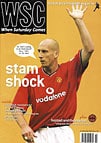 With the club failing to find somewhere suitable to relocate, the owners seem intent on cutting their losses. Ole P Pedersen explains how businessman usually expect to get their own way – but in football that's not neccessarily the case
With the club failing to find somewhere suitable to relocate, the owners seem intent on cutting their losses. Ole P Pedersen explains how businessman usually expect to get their own way – but in football that's not neccessarily the case
As Wimbledon’s Norwegian owners suffer another setback in their quest for relocating the club, the battles over the club’s future have not caused much of a stir with the media in Norway. VG, Scandinavia’s biggest daily, noted in passing that Bjorn Rune Gjelsten, the main owner of Wimbledon, had again failed to move the club from its humble surroundings to “more prosperous and forward-thinking communities”.
The Wimbledon fans’ protests against Gjelsten’s plans to move the club to Milton Keynes passed virtually unnoticed in the Norwegian media. If it hadn’t been for London-based Dons fan Vegard Ovrelid, criticism of the proposed move might have been totally ignored in VG.
Ovrelid, who writes for the Norwegian supporters’ club fanzine, warned Gjelsten through VG not to turn up at the club. “He’s deceived everyone,” said Ovrelid when the proposed move became public. The conflict was covered better in the much smaller Dagbladet, though they were quick to report that Robbie Earle supported the move.
When Gjelsten, together with his even richer friend Kjell Inge Rokke, bought Wimbledon, the media in Norway were excited. Even more so when Norway’s football icon, Egil Olsen, took his wellies with him and tried to manage the team. The Wyndmore company, which bought the shares in Wimbledon, was touted as becoming a significant force in football. There were big plans for both Wimbledon and Molde, Rokke’s hometown club.
Rokke and Gjelsten are big players in Norway through their company Aker RGI (where Rokke is the main man). A flurry of mergers and takeovers has made Aker RGI the most important industrial company in the country. Today, Rokke has a withdrawn role at Wimbledon and devotes his time to troubled Molde, where most of the backroom staff have threatened to resign due to internal strife. Rokke has ordered some cost-cutting exercises which have led, among other things, to the unpopular transfer of winger Odd Inge Olsen to the champions, Rosenborg.
Rokke is a man in a hurry, and after three years of failure in south-west London, he is no longer particularly interested in Wimbledon. The Nationwide League is not for him. Rokke entered football at financially the worst moment of all, just before the stock market bubble burst. As in other areas of his industrial career, he prefers to take his losses early and move on.
He will not give up Molde, though, and their seemingly impossible quest to become the top club in Norway. Rokke is Molde born and bred, 7and takes great pride in spending some of his fortune on several projects in his home town, including the new club stadium.
Gjelsten now owns 20 per cent of Wyndmore personally, and there has been speculation that the multimillionaire (he has sold a lot of his shares in other companies) may take full control. The company lost almost £10 million last year, but Gjelsten still hopes Wimbledon might win promotion this season, despite some heavy cost-cutting exercises.
Gjelsten is more withdrawn than Rokke, but they share a passion for fast cars and boats. Gjelsten competes in the world championships of offshore boat racing, and is quite good – at least compared to the other millionaires that participate in that particular sport.
Rokke and Gjelsten’s Aker RGI are currently locked in a battle to take control of the other industrial giant in Norway, Kvaerner, who so far have fended off the possible takeover. Quite a few shareholders would not like Rokke to succeed in this raid. Rokke, on the other hand, would like to get hold of some more cash reserves, as several of his previous takeovers of other companies have been financed by some rather helpful banks. By keeping a high tempo of aquisitions and mergers, he also keeps the cash flowing. Which might suggest that Rokke, at least, will not stay involved in Wyndmore much longer, leaving Gjelsten as the only Norwegian left at Wimbledon.
Gjelsten does at least seem to accept that turning Wimbledon into a Premiership club once more may be a long term project, but he is not likely to take no for an answer when it comes to relocating the club, or trying for another merger. However, like so many other businessmen used to getting their own way, he may find that football clubs, and especially their fans, play by different rules.
From WSC 176 October 2001. What was happening this month